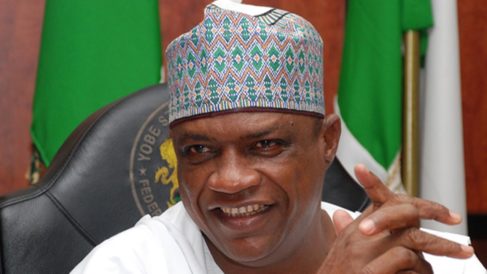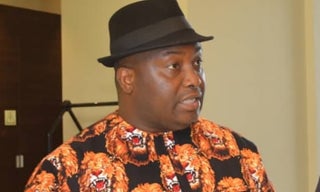Opposition voices knock Gaidam over bill on Boko Haram

The lawmaker representing Yobe East Senatorial District and former governor of Yobe State, Senator Ibrahim Gaidam, is having a hard time convincing Nigerians, especially major stakeholders from the north and officials of the security forces that have been battling to contain the raging insurgency over the years why he chose to introduce a bill for an act to establish National Agency for Deradicalisation, Rehabilitation and Reintegration of Repentant Boko Haram members. While the Yobe senator tried to convince Nigerians that the bill was simply to entice members of Boko Haram to abandon their evil path and join hands with the government to quell the rising spate of insurgence across the country, especially in the Northeast, some aggrieved stakeholders called for his (Gaidam) investigation to know if he is in anyway culpable in the injury members of the sect have inflicted on hapless Nigerians over the years.
First to kick against what has been termed an ‘obnoxious’ bill is the Senator representing Borno South Senatorial District, Ali Ndume, whose people have been at the theatre of terror war for close to 10 years now.
According to him, “I personally disagree with that. The war is not over and some criminals that have been killing people, you say you are doing Operation Safe Corridor for them. I am completely against that idea. They know my position on that; you can’t do that. It is when you win the war and some people surrender that you think about something like that. You are just telling people to go and join Boko Haram and then repent and become something; that’s a totally unacceptable idea and a way of solving the problem.”
Also, the Arewa Youths Consultative Forum has called on relevant agencies to investigate Senator Gaidam, who proposed the bill, describing the proposed bill as a “stupid piece of legislation”.
While addressing newsmen in Abuja recently, Gaidam said the main objective of the Bill is to provide an avenue for rehabilitating, deradicalising, and reintegrating the defectors, repentant and forcefully conscripted members of the insurgent group to make them useful members of the society. The controversial bill, which was mentioned for first reading in the senate, was stiffly opposed as stakeholders rejected the move to make life comfortable for people that have inflicted deaths and injuries on Nigerians.
But Gaidam sees it differently, saying since the sect is becoming increasingly aggressive, marked by extreme brutality and explicit targeting of civilians, it was expedient and instructive to go back to the drawing board and adopt an alternative approach in addition to the military option. He said there is the need for a more strategic and comprehensive approach to entice those members of the group who, after realizing the futility of the course they are pursuing, have eventually decided to voluntarily lay down their arms and chose the path of peace.
“There is no doubt that many members of the insurgent group have defected and many more are willing to repent given a window of opportunity and this is confirmed by many organizations, including NGO’s that have access to the Boko Haram faithful.”
Gaidam said with the repentant disposition of the sect members in recent times, particularly those that were forcefully conscripted,
“There is need for the establishment of the National Agency for the ‘Rehabilitation, Deradicalization and Reintegration of Repentant Insurgents’ to accommodate the defectors. The agency when established, he said, shall be charged with the responsibility of planning, designing and organising specialized programmes aimed at deradicalising, rehabilitating, and reintegrating defectors and repentant insurgents.”
The lawmaker indicated that the specialised programmes would serve as mechanisms for disengagement from terrorism ideology and invalidate the recourse to violence.
He said it would focus on ideological, religious, educational, vocational, social, creative arts therapy, sports and recreation and psychological issues that cause violent extremism. Geidam further explained that the bill provides for varied deradicalisation and rehabilitation process for former members of Boko Haram on a case-to-case basis, noting, “Those who have become weary of the perpetual violence and have voluntarily laid down their arms and defected from the group will be accepted and rehabilitated using various tools of deradicalisation, rehabilitation and reintegration.
“In contrast, those captured active in the battlefields will be required to, in addition to the psychological therapy, participate in the criminal justice process, provide an avenue for reconciliation and promote national security, provide an-open-door and encouragement for other members of the group who are still engaged in the insurgency to abandon the group, especially in the face of the military pressure, and allow the government to derive insider-information about the insurgency group for greater understanding of the group and its inner workings.”
He said if the bill scales through and its contents implemented it would help in a greater understanding of the insurgents to enable government study the needs of deradicalisation effort, improve the process, and address the immediate concerns of violence.
“It would also enable government to use the defectors to fight the unrepentant insurgents, help disintegrate the violent and poisonous ideology that the group spreads as the programme will allow some repentant defectors or suspected terrorists to express remorse over their actions,” he concluded. “If defectors told their stories and are made more public, their experiences would play a key role in countering terrorist propaganda, which in turn would lessen the appeal of joining the group, help undercut the costs of incarceration and ensure individuals who would otherwise have lives entrenched in criminality become productive members of society.”
But some serving lawmakers disagreed with Gaidam, saying the bill was needless, a waste of resources and misplaced priority. This is even as they questioned the nationality of the insurgents. They expressed concern that releasing the purported repentant Boko Haram militants into civilian population could be counterproductive, as hardened fighters would return to the terror group to commit more atrocities.
It would that the Senator representing Ondo Central, Ayo Akinyelure, said there was no justification for the bill and questioned the real nationality of the insurgents.
“These are criminals to whom life means nothing,” he said. “So, what type of rehabilitation are we going to give them? Do you even know if they are Nigerians? Most of them are not Nigerians. They are from Niger Republic and other neighbouring countries. They just believe that terrorising us and taking our resources is what are their major concerns. When you now say you want to establish an agency, then you are now harbouring terrorists in your country and you are giving recognition that you’re keeping them by opening an agency.
“Before you know it, they will resettle around Nigeria and attack and take over. It doesn’t make sense. The best thing is for them to go back to their countries and if they want to repent, they repent and surrender. That’s all.”
While he said the insurgents could not be rehabilitated, the lawmaker advised that funds should be used to correct infrastructural decay, adding, “There is no justification for the creation of such agency. How can an enemy be rehabilitated? These are people who have done Nigeria so much harm – killing people that they cannot create, and you want to establish… So, what are we budgeting trillions yearly for our security agencies?
“We have a lot of infrastructural decay all over the country. Our roads are bad. An average Nigerian cannot enjoy good roads, electricity, water supply both in the city and villages and you want to use the little resource available to rehabilitate your enemies.”
Erstwhile Senator Shehu Sani from Kaduna State also kicked against the bill, saying the situation in the Northeast has been properly taken care of with the establishment of the North East Development Commission (NEDC).







